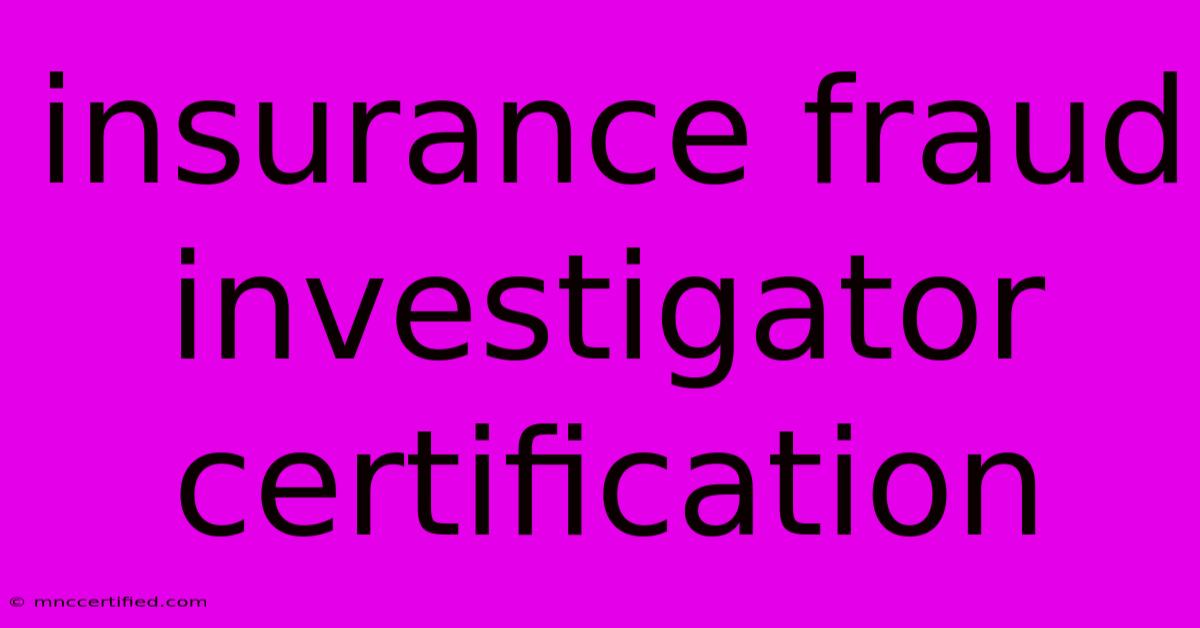Insurance Fraud Investigator Certification

Table of Contents
Cracking the Code: Your Guide to Insurance Fraud Investigator Certification
Insurance fraud is a serious problem, costing billions of dollars annually. This has led to a growing demand for qualified professionals who can detect, investigate, and prevent fraudulent claims. If you're interested in a rewarding career with a strong sense of purpose, becoming an insurance fraud investigator might be the perfect path for you. But how do you get started?
The Importance of Certification
While not always a legal requirement, insurance fraud investigator certification provides you with a competitive edge in the job market. It demonstrates your commitment to professional development and signals your expertise to potential employers. Certification programs offer comprehensive training that equips you with the skills needed to excel in this field.
Types of Insurance Fraud Investigator Certifications
Several organizations offer certifications for insurance fraud investigators. Some of the most recognized options include:
- Certified Fraud Examiner (CFE): This prestigious credential from the Association of Certified Fraud Examiners (ACFE) is a highly sought-after designation in the fraud investigation field. It covers a wide range of fraud types, including insurance fraud.
- Certified Insurance Fraud Investigator (CIFI): This certification, offered by the National Insurance Crime Bureau (NICB), specifically focuses on insurance fraud investigations.
- Certified Insurance Fraud Specialist (CIFS): This certification, offered by the National Insurance Crime Bureau (NICB), focuses on insurance fraud detection and prevention.
- Certified Claims Professional (CCP): While not solely focused on fraud investigation, this certification from the American Society of Claims Professionals (ASCP) provides a solid foundation in claims handling, which is essential for fraud investigators.
Key Skills and Knowledge
To be successful as an insurance fraud investigator, you need to possess a strong foundation in key areas:
- Understanding of Insurance Concepts: A thorough understanding of insurance policies, claims processes, and common fraud schemes is essential.
- Investigative Techniques: You'll need to master interview techniques, evidence collection, document analysis, and other investigative methods.
- Legal and Regulatory Knowledge: Staying updated on relevant laws, regulations, and case law is crucial for successful investigations.
- Technology Proficiency: Proficiency in using software for data analysis, surveillance, and digital forensics is becoming increasingly important.
- Excellent Communication and Writing Skills: Effective communication is vital for building relationships with witnesses, gathering information, and presenting findings in reports.
Benefits of Certification
Earning an insurance fraud investigator certification can bring numerous benefits:
- Increased Job Opportunities: Certification sets you apart from the competition, making you a more attractive candidate to employers.
- Higher Earning Potential: Certified professionals often command higher salaries compared to their non-certified counterparts.
- Professional Recognition and Credibility: A certification demonstrates your commitment to the field and your expertise to clients and colleagues.
- Continuing Education and Professional Growth: Certification programs often require continuing education, ensuring you stay up-to-date with the latest trends and advancements in fraud detection.
How to Prepare for Certification
Preparation is key to success in any certification program. Here are some steps you can take to increase your chances of success:
- Research Different Certification Programs: Explore the various certification options and choose the one that best aligns with your career goals and experience.
- Gain Relevant Work Experience: Hands-on experience in insurance or related fields can be invaluable in preparing for certification exams.
- Enroll in Preparatory Courses: Many organizations offer preparatory courses or study materials specifically designed to help you pass certification exams.
- Practice and Review: Dedicate sufficient time to reviewing course materials, practicing exam questions, and reinforcing your knowledge.
Conclusion
Becoming an insurance fraud investigator offers a challenging and rewarding career path. Certification can provide a significant advantage, demonstrating your commitment to professional excellence and enhancing your marketability. By investing in your education and gaining the necessary skills, you can contribute to fighting insurance fraud and make a real difference in the industry.

Thank you for visiting our website wich cover about Insurance Fraud Investigator Certification. We hope the information provided has been useful to you. Feel free to contact us if you have any questions or need further assistance. See you next time and dont miss to bookmark.
Featured Posts
-
Unexpected Reason Behind Bayerns Champions League Start
Nov 07, 2024
-
Does Medical Insurance Cover Atv Accidents
Nov 07, 2024
-
Insurance And Risk Management Online Degrees
Nov 07, 2024
-
Gary Barlow Sons Height A Family Comparison
Nov 07, 2024
-
Can I Sell Life Insurance In Another State
Nov 07, 2024